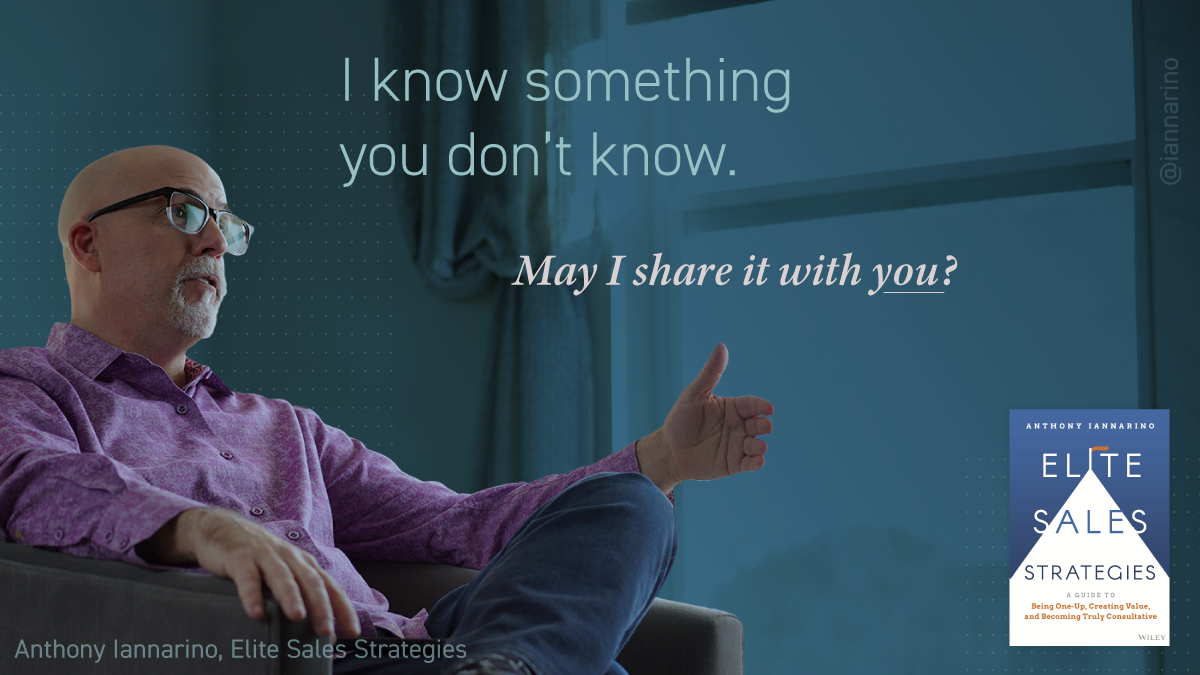Most of our approaches to sales can be compared to what LTG McMaster (U.S. Army Retired) describes as strategic narcissism: "the tendency to define challenges to national security as we would like them to be and to pay too little attention to the agency that others have over the future."
In his testimony before the Senate Armed Services Committee Hearing on Global Security Challenges in 2021, LTG McMasters said: "To improve our strategic competence, it is important that our nation’s foreign policy, national security strategy, and national defense strategy reject a narcissistic view of the world in favor of what the historian Zachary Shore calls strategic empathy, an effort to view the challenges and opportunities we face from the perspective of others, especially our rivals, adversaries, and enemies." Later in McMaster's testimony, he suggested "an archetype of strategic narcissism . . . disregards the authorship that others have over our future."
Evidence of Strategic Narcissism In Sales
The very definition of strategic narcissism is to define challenges as we would like them to be while ignoring the agency that others have over our results.
The Linear Sales Process: Let's start with the legacy sales process, the linear conception that provided salespeople with a paint-by-number approach to the sales conversation. After using the approach for a good number of years, I found that it didn't seem to work as well for clients, many of whom needed a different conversation. I described myself as "agnostic," when in the truth I was a nonbeliever when it came to the sales process.
It is strategic narcissism to believe that this linear process was designed and pursued as a way to ensure a salesperson has the best chance of success, with no regard for what their prospective clients might need.
Solution Selling: The idea that the salesperson's approach should be based on identifying a problem and the client's pain as a way to lead to the company's solution is also strategic narcissism. When you do discovery with the sole intention of proposing your solution, there is strong evidence of strategic narcissism. There are few buyers who are unaware of the pattern of the conversation that ends with your solution being the right answer for your prospective client.
The Marketing Product Industrial Complex: The idea that a decision maker or stakeholder is sincerely interested in a history lesson about your company and your legendary founder, followed by a look at the trophy cabinet that is your client's logos, topped off by a conversation about your products and services before asking the client to confess their problems is extreme strategic narcissism.
A monologue about you and your company is the opposite of other-oriented. Your contacts hoped you would be interested in them or some conversation they might find more valuable. Little to none of what you say that is designed to answer the question "Why Us," is going to prove you are the right choice to help the client improve their results.
Strategic Empathy
Zachary Shore, the historian McMaster cites in his testimony, describes strategic empathy as "an effort to view the challenges and opportunities we face from the perspective of others."
Your challenge winning deals must take into account what your prospective client needs from the conversation. Any agenda should start with strategic empathy.
Empathy in The Nonlinear Sales Conversation
There is strong evidence that decision makers, contacts, and stakeholders have their own agenda and their own needs. While many of your contacts have been conditioned to expect a certain conversation in a particular order, many of your contacts will struggle to follow that well-worn pattern, asking questions and pursuing their own needs. Asking the client to share with you what they need from your conversation with them is a way to practice strategic empathy.
This approach doesn't mean giving up some control of the conversation, as your vantage point (see Elite Sales Strategies: A Guide to Being One-Up, Creating Value, and Becoming Truly Consultative) provides you with the right and the obligation to ensure your clients have the necessary conversations, even if they are out of the order you would prefer.
Empathy and Your Solution
How often do you walk away from a prospective client because your solution isn't the best fit when it comes to producing the results they need to improve? If your solution is always right in all cases, regardless of the fact pattern, you may be guilty of a form of strategic narcissism.
Empathy is something different from disqualifying the prospective client. It is recognizing that the way you would improve their results is not the best choice for the client and telling them who and what they should consider instead. You're walking away because your solution isn't right for your prospect.
Strategic empathy would have meant already knowing what kinds of problems your prospective clients have and providing them with an understanding of why their results are less than they should be. Unless it's your third day on the job, how is it possible you could sell every day without recognizing the results your clients need to improve, and what prevents them from creating the better outcomes they need?
There are a lot of things you need to ask your prospective clients, and there is every reason to occupy the position of being One-Down and learning from your prospective clients by asking them what kind of problems they have. The only reason you called your prospective client was that you believe you can help them improve some result, but not every result they need.
It is important to pay more attention to the agency that others have over your future. A sales conversation that doesn't take into account what your clients need from the conversation may be the result of strategic narcissism. Improving the conversation means shifting to strategic empathy by recognizing what your prospective clients need and delivering it.









.jpg?width=768&height=994&name=salescall-planner-ebook-v3-1-cover%20(1).jpg)


